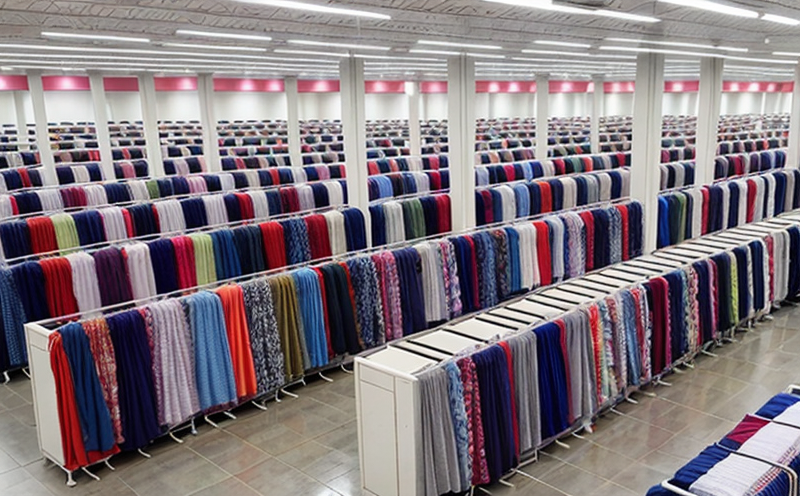ISO 9073 Nonwoven Fabric Strength Testing for Export Textiles
ISO 9073 is a standard that specifies methods for determining the tensile strength and elongation of nonwovens. This testing ensures that textiles meet quality standards before being exported, which is crucial for maintaining brand reputation and ensuring compliance with international trade regulations.
The testing process involves several steps. First, specimens are cut from the fabric according to specific dimensions outlined in ISO 9073. The specimens are then clamped into a tensile testing machine that applies controlled force until failure occurs. The amount of force needed to cause failure and the elongation at this point are measured.
The results provide insights into the mechanical properties of the fabric, which is essential for quality control during export. Nonwovens used in textiles can vary significantly depending on their intended use—whether for medical purposes or industrial applications—and testing according to ISO 9073 ensures that all exported fabrics meet these varying requirements.
Nonwoven fabrics are widely used across various sectors including healthcare, automotive, and home furnishing. In the healthcare sector, nonwovens must be tested rigorously before export to ensure they do not contain harmful substances or have poor mechanical properties that could compromise patient safety. Similarly, in the automotive industry, nonwovens need to withstand high levels of stress without breaking down easily.
For home furnishing applications, durability and comfort are key factors when determining appropriate strength requirements for fabrics used in pillows, mattresses, and upholstery. By adhering strictly to ISO 9073 standards during manufacturing processes, manufacturers can ensure that their products meet international quality expectations before being shipped abroad.
The importance of accurate testing cannot be overstated; it not only protects the manufacturer's interests but also safeguards end-users from potentially harmful materials or substandard products. Governments worldwide have implemented strict regulations regarding textile imports and exports to protect consumers' health and safety while promoting fair trade practices.
Implementing ISO 9073 testing as part of your quality assurance process is essential for maintaining compliance with global standards, thereby facilitating smoother international transactions and enhancing customer satisfaction among buyers abroad.
Eurolab Advantages
- Comprehensive expertise in textile analysis and nonwoven fabric testing.
- State-of-the-art equipment for precise measurements ensuring reliable results.
- Dedicated team of experienced scientists specializing in textile science and engineering.
- Access to cutting-edge analytical tools enabling accurate assessment of fabric performance characteristics.
At Eurolab, we pride ourselves on delivering top-tier services tailored specifically towards our clients' needs. Our comprehensive approach ensures that every sample receives personalized attention from start to finish, guaranteeing consistent accuracy and consistency across all tests conducted.
We are committed to providing unparalleled service excellence by leveraging advanced technologies while maintaining strict adherence to international standards such as ISO 9073. This commitment translates into trustworthy outcomes that build long-term relationships with satisfied customers worldwide.
International Acceptance and Recognition
- The International Organization for Standardization (ISO) has developed multiple standards related to nonwovens, including ISO 9073 which is specifically focused on tensile strength testing.
- Other relevant international bodies like ASTM International also provide guidance through their own set of specifications that may complement or supplement those from ISO depending upon regional preferences.
| Standard | Description |
|---|---|
| ISO 9073-1:2015 | Tensile strength and elongation at break of nonwovens, part 1: General principles. |
| ASTM D3786-14 | Tear resistance of fabrics using Instron type testing machine. |
Adherence to these standards ensures that the results are universally accepted and comparable across different regions. Compliance with international norms not only facilitates easier entry into foreign markets but also enhances credibility among stakeholders involved in textile manufacturing and trade.
Use Cases and Application Examples
- In healthcare, nonwoven fabrics are used in medical gowns, drapes, and face masks. Testing their tensile strength according to ISO 9073 ensures they can withstand the rigors of sterilization processes without compromising on integrity.
- For automotive interiors like seat covers or insulation materials, rigorous testing helps ensure durability under various conditions such as temperature fluctuations and physical wear.
| Application | Tensile Strength (N) | Elongation (%) |
|---|---|---|
| Medical gown | > 150 N | > 30% |
| Automotive seat cover | > 200 N | > 40% |
These examples illustrate how precise measurement plays a critical role in ensuring product performance meets regulatory requirements and exceeds customer expectations. Understanding these parameters allows manufacturers to optimize their production processes, leading to higher quality products at competitive prices.





